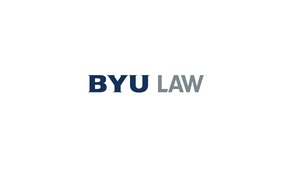PROVO, Utah, Feb. 2, 2022 /PRNewswire/ -- BYU Law, a global law school focused on leadership in legal theory and practice, today announced it will hold its seventh annual Law and Corpus Linguistics Conference Feb. 3-4 via hybrid (in-person and virtual) format. The event, sponsored by Schaerr Jaffe, LLP, will convene prominent legal and linguistics scholars, judges and industry professionals interested in furthering the discipline of corpus linguistics – the methodology for understanding the meaning of words at the time they were written by analyzing language in large collections of texts called "corpora."
"In addition to hosting this conference annually since 2013, BYU Law has developed pioneering legal research corpora and tools to analyze the ordinary meaning of words and help make legal decisions more transparent," said D. Gordon Smith, dean, BYU Law. "A primary focus of this year's conference is how to move corpus evidence from theoretical tools to useful evidence in the courtroom, including linguists as expert witnesses and effective strategies for using corpus linguistics in amicus briefs."
2022 Conference
During BYU Law's seventh annual Law and Corpus Linguistics Conference, panelists and participants will discuss best practices in corpus methods, interpretation applications and related topics. This year's keynote presenter is Judge Amul Thapar of the United States Sixth Circuit Court of Appeals, an advocate for including corpus linguistics in the judicial toolkit. Judge Thapar took notice of corpus linguistics during a 2019 pension case that relied on corpus linguistics in a concurrence – the first known instance of a federal judicial opinion doing so.
The first panel session, moderated by corpus linguistics expert Jesse Egbert, assistant professor of applied linguistics at Northern Arizona University, will address "Corpus Linguists as Expert Witnesses." The second panel, titled "Best Practices for Corpus Linguistics in Amicus Briefs," will be moderated by James Heilpern, senior law and corpus linguistics fellow at BYU Law and author of an amicus brief in the Rimini Street v. Oracle Supreme Court case. This session will also include a presentation by Clark D. Cunningham, law and ethics professor at Georgia State University College of Law (and coauthors) on corpus linguistics research presented in a murder case before the Georgia Supreme Court addressing the topic, "What does it mean to search a cell phone?"
The event will conclude with a panel titled, "The Domain of Law and Corpus Linguistics: Factors Affecting the Utility of Corpus Tools in Legal Interpretations," moderated by Utah Supreme Court Justice Thomas Lee. A pioneer and expert in the use of linguistic theory and tools for interpreting the language of the law, Lee has taught classes on law and language with an emphasis on principles of corpus linguistics at BYU Law and Harvard Law School.
For more information about the conference, including the full agenda, visit https://corpusconference.byu.edu/2022-home/conference-info/ or click here to register. The hybrid conference offers remote participants the opportunity to comment and ask questions via live Zoom chat.
Linguist Workshop
The seventh annual Law & Corpus Linguistics Conference will include a workshop for any attending linguists on Thursday, Feb. 3 from 1 p.m. to 4 p.m. (MT). This workshop, led by BYU law and linguistics faculty, is meant to introduce the field of law as well as describe issues those in the legal field often encounter that corpus linguistics has been or could be used to address. It will touch on constitutional and statutory interpretation as well as communication between the legal community and the public (e.g., Miranda rights, jury instructions, immigrant interviews, etc.). Practicing linguists, graduate students and early career scholars who are interested in applying linguistics to legal issues are encouraged to attend. Interested attendees, please complete the registration form.
In addition to hosting this annual conference, BYU Law develops pioneering legal research corpora, and fosters influential scholarship and training using this method. In 2021, BYU Law released the public version of its law and corpus linguistics platform and search interface. Available at lawcorpus.byu.edu, the database has been used by thousands of researchers, including federal and state justices, and appellate attorneys. The platform enables legal professionals to analyze the meaning of words that can be applied to current cases, with several of the corpora having been referenced in legal opinions.
About BYU Law School
Founded in 1971, the J. Reuben Clark Law School (BYU Law) has grown into one of the nation's leading law schools – recognized for innovative research and teaching in social change, transactional design, entrepreneurship, corpus linguistics, criminal justice and religious freedom. The Law School has more than 6,000 alumni serving in communities around the world. In its most recent rankings, National Jurist recognized BYU Law as the #1 best-value law school in its 2021 ranking. For more information, visit https://law.byu.edu.
SOURCE BYU Law

WANT YOUR COMPANY'S NEWS FEATURED ON PRNEWSWIRE.COM?
Newsrooms &
Influencers
Digital Media
Outlets
Journalists
Opted In




Share this article